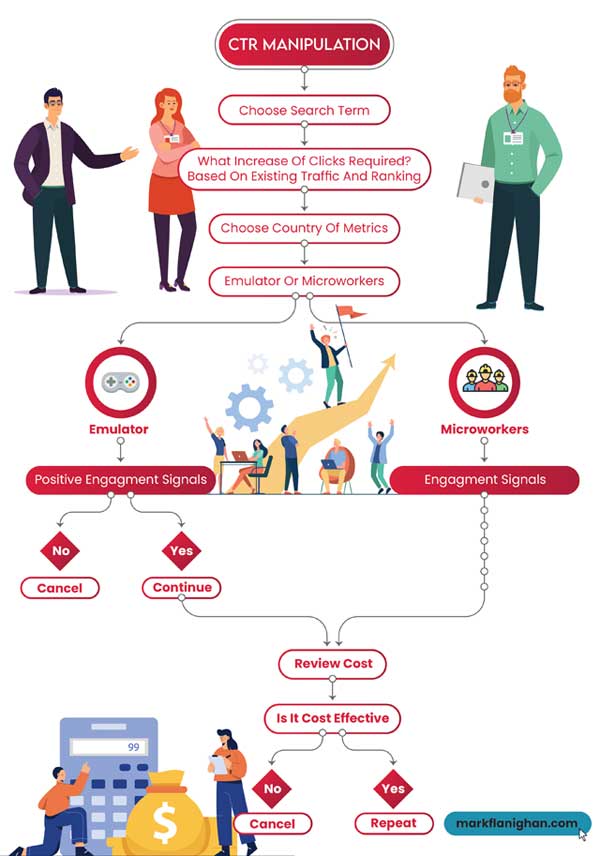CTR Manipulation Press Release: Announcing Innovative Strategies for Better Search Engine Optimization
CTR Manipulation Press Release: Announcing Innovative Strategies for Better Search Engine Optimization
Blog Article
The Effect of CTR Adjustment Providers on Search Engine Algorithms
In the detailed realm of search engine optimization, the emergence of CTR adjustment services has actually stimulated a significant discussion within the SEO community. As search engines continuously refine their formulas to offer users with the most pertinent and trustworthy results, the method of artificially blowing up click-through rates has actually raised brows and concerns.

Climbing Worries in SEO Area
The raising occurrence of click-through rate (CTR) manipulation strategies has sparked expanding worries within the SEO area. As online search engine increasingly depend on individual engagement metrics like CTR to determine the importance and authority of a website, the technique of synthetically inflating these metrics has actually raised moral and useful questions.
One significant concern is the prospective distortion of search engine results brought on by CTR manipulation. Sites using such tactics can deceive online search engine formulas into rating them greater than they are worthy of, bring about a manipulated representation of the most appropriate and authoritative material for individuals. This control threatens the honesty of search engine results, compromising the individual experience and the trustworthiness of online search engine.
Furthermore, the escalating use CTR control services presents a risk to the equal opportunity that SEO aims to establish. Smaller companies or websites with limited resources may have a hard time to take on those participating in manipulative techniques, developing an unjust advantage for entities with the means to manipulate such strategies. Consequently, the search engine optimization area is requiring higher transparency, ethical standards, and algorithmic changes to combat CTR control and maintain the stability of online search engine results.
Devices of CTR Adjustment
Exerting control over click-through prices (CTR) through deceitful methods has actually ended up being a prevalent approach utilized to manipulate internet search engine formulas. One mechanism used for CTR adjustment includes the use of click ranches, where people or automated bots are paid to click specific web links continuously. These synthetic clicks develop the impression of high individual interest, triggering search engines to rank the targeted page higher in search outcomes.
One more common technique is the application of misleading meta-information, such as incorrect title tags or meta descriptions, to bring in clicks from individuals that may not locate the real material pertinent. By deceiving customers into clicking the link, manipulators can unnaturally inflate the CTR, bring about improved search engine rankings.
In addition, some specialists engage in CTR manipulation by participating in click exchange systems, where internet sites concur to click each other's links to enhance CTR unnaturally. This reciprocal hitting might not reflect authentic customer interest however can affect search engine algorithms, influencing the visibility of the involved web sites in search outcomes.
Detection Challenges for Internet Search Engine
Provided the innovative methods utilized by manipulators to synthetically blow up click-through prices, search engines deal with considerable obstacles in properly finding circumstances of CTR control. Manipulators usually make use of tactics such as click farms, click robots, and IP spoofing to mimic real user behavior and deceive search engine formulas. These methods make it tough for online search engine to set apart in between genuine user communications and synthetically created clicks.
In addition, manipulators continually advance their strategies to escape discovery, making it a continuous cat-and-mouse ready internet search engine developers. ctr manipulation service. The sheer quantity of information produced from individual interactions further makes complex the job of determining anomalies that may show CTR adjustment
Online search engine rely on complex formulas and artificial intelligence models to sift via substantial quantities of data and spot patterns that recommend adjustment. As manipulators come to be more innovative in their methods, search engines must continually fine-tune their detection techniques to remain ahead of these destructive actors. Cooperation in between online go search engine developers, cybersecurity professionals, and market stakeholders is essential in creating efficient methods to battle CTR control and keep the integrity of search engine results.
Mathematical Effects of CTR Manipulation
Comprehending just how CTR manipulation effects online search engine algorithms needs a deep dive right into the intricacies of user interaction data evaluation. Internet search engine rely greatly on customer actions signals, such as click-through rates (CTR), to examine the relevance and quality of web sites (ctr manipulation service). When CTR adjustment takes place, where artificial clicks are produced to deceive search engines, the algorithms that interpret these signals can be misinformed
One trick algorithmic effects of my link CTR manipulation is the prospective skewing of natural search results page. If adjusted CTR data recommends that a certain web site is much more preferred or pertinent than it actually is, the internet search engine may place it greater in search engine result, leading to a distortion of the organic ranking community. This can be damaging to both users, who might obtain much less pertinent search results, and genuine sites that are pushed down in rankings unfairly.
Moreover, search engine algorithms are continuously advancing to combat manipulative tactics. As search engines become more innovative in detecting CTR manipulation patterns, web sites engaged in such practices might deal with charges, such as lower rankings or even removal from search results. Comprehending the algorithmic effects of CTR adjustment is important for preserving the integrity and performance of search engine formulas.
Ethical Factors To Consider for Web Site Owners

Final Thought
In final thought, the effect of CTR manipulation solutions on online search engine algorithms is a topic of rising problem within the search engine optimization community. The devices of CTR adjustment present difficulties for online search engine in discovering these practices. The mathematical ramifications of CTR this article manipulation can alter search results page and influence the general stability of search engine rankings. Website proprietors should think about the ethical effects of participating in such techniques to preserve a reasonable and clear digital landscape.
Report this page